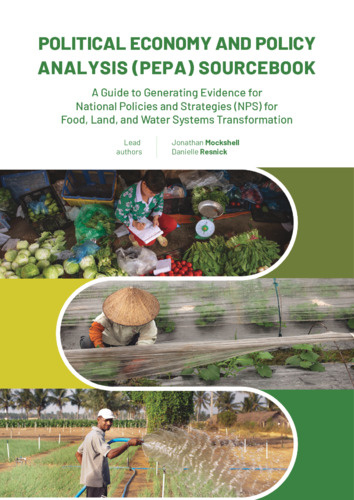Political Economy and Policy Analysis (PEPA) Sourcebook. A guide to generating evidence for National Policies and Strategies (NPS) for food, land, and water systems transformation
Agri-food systems face multiple challenges. They must deal with prevailing structural weaknesses, partly deepened by the disruptions from the COVID-19 pandemic, civil conflicts, and climate change. Addressing structural weaknesses – such as inequitable access to healthy and nutritious food for all, loss of livelihoods and incomes, and increasing environmental shocks – requires not only technological, but also institutional innovations, as well as economic and policy responses. While development interventions often focus on technological innovations, they lack attention to the enabling policy environment and the political economy drivers necessary to achieve policy, economic, and social impact at the national level. In addition, solutions often fail to analyze the broader enabling environment in which policies are designed and implemented at the national level. A comprehensive understanding of the policy environment coupled with appropriate technological and institutional solutions can influence the success or failure of development interventions. However, political economy and policy analysis considerations are inadequately explored in the quest to transform food systems. Identifying the right policies and overcoming barriers to the implementation of development interventions fundamentally requires an understanding of the political economy and policy processes that shape policymaking. Despite numerous emerging approaches and frameworks for conducting political economy and policy analysis, practitioners and researchers working across food, land, and water systems lack a consolidated knowledge base. This Political Economy and Policy Analysis (PEPA) sourcebook aims to fill that knowledge gap.

